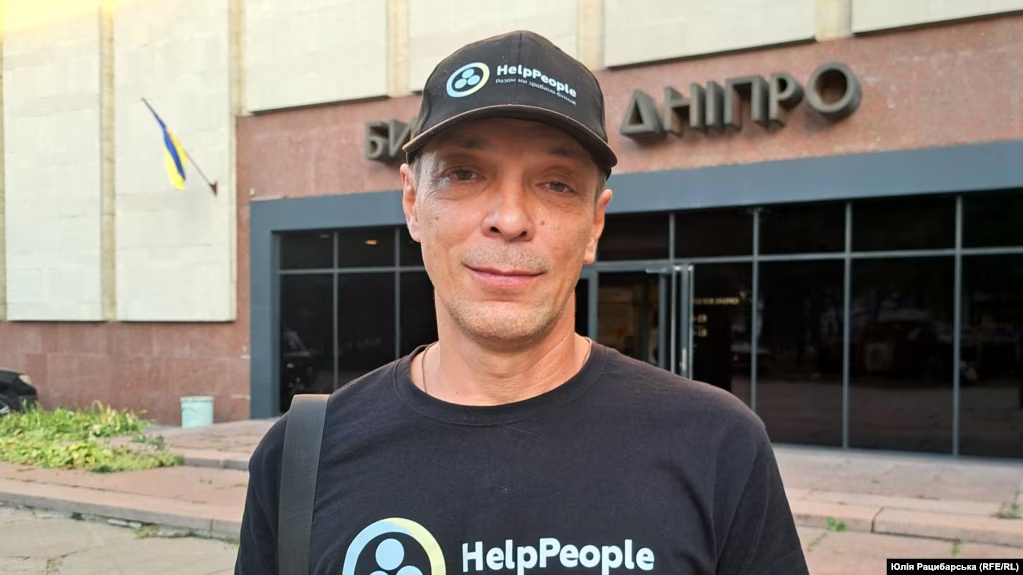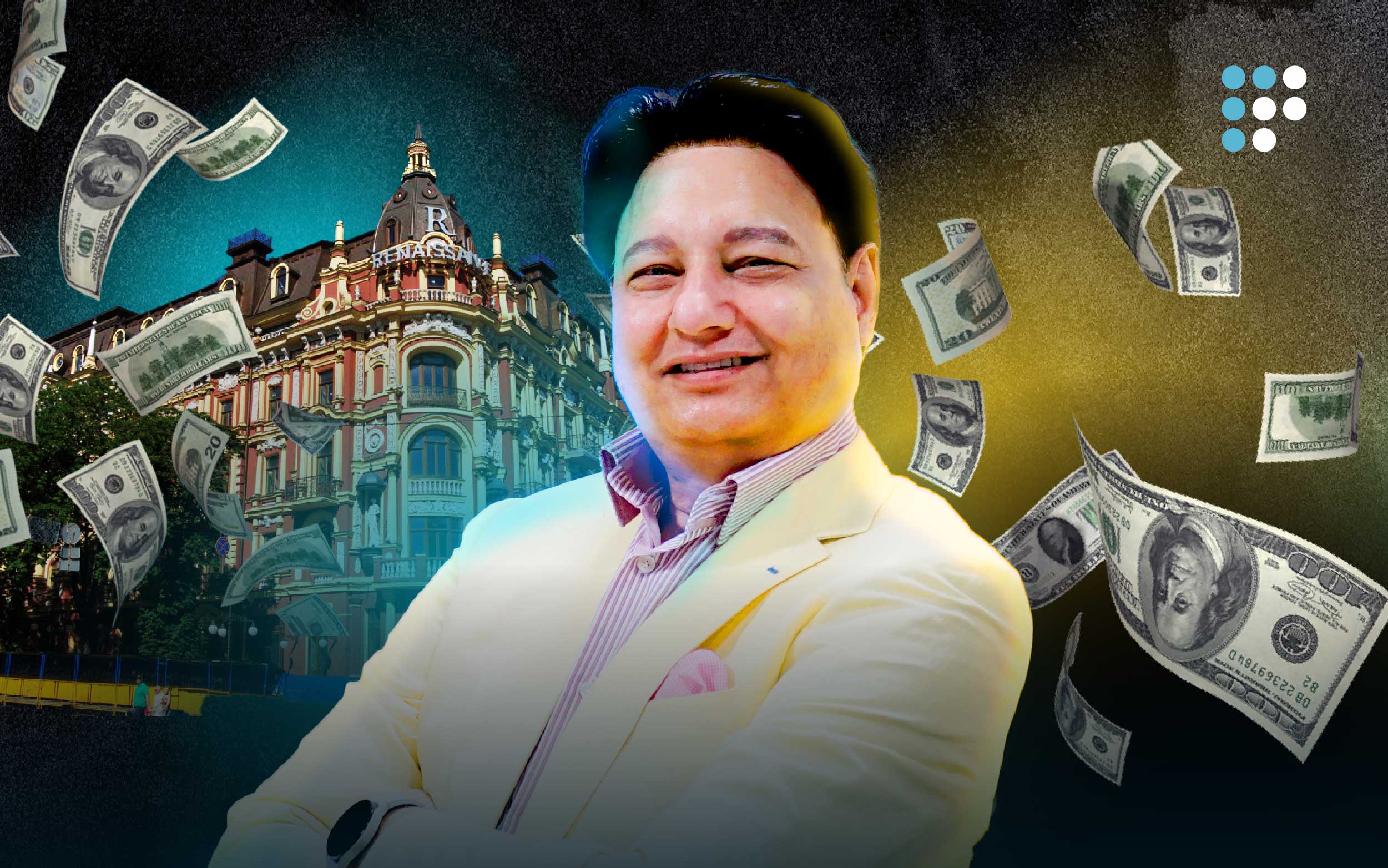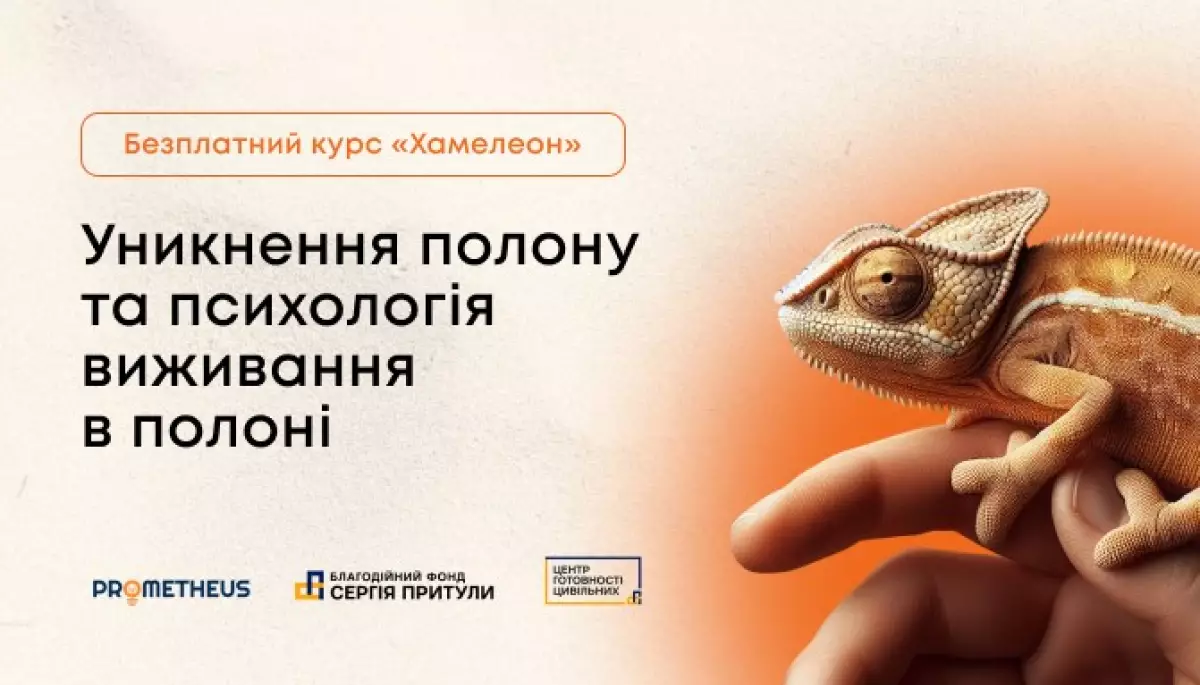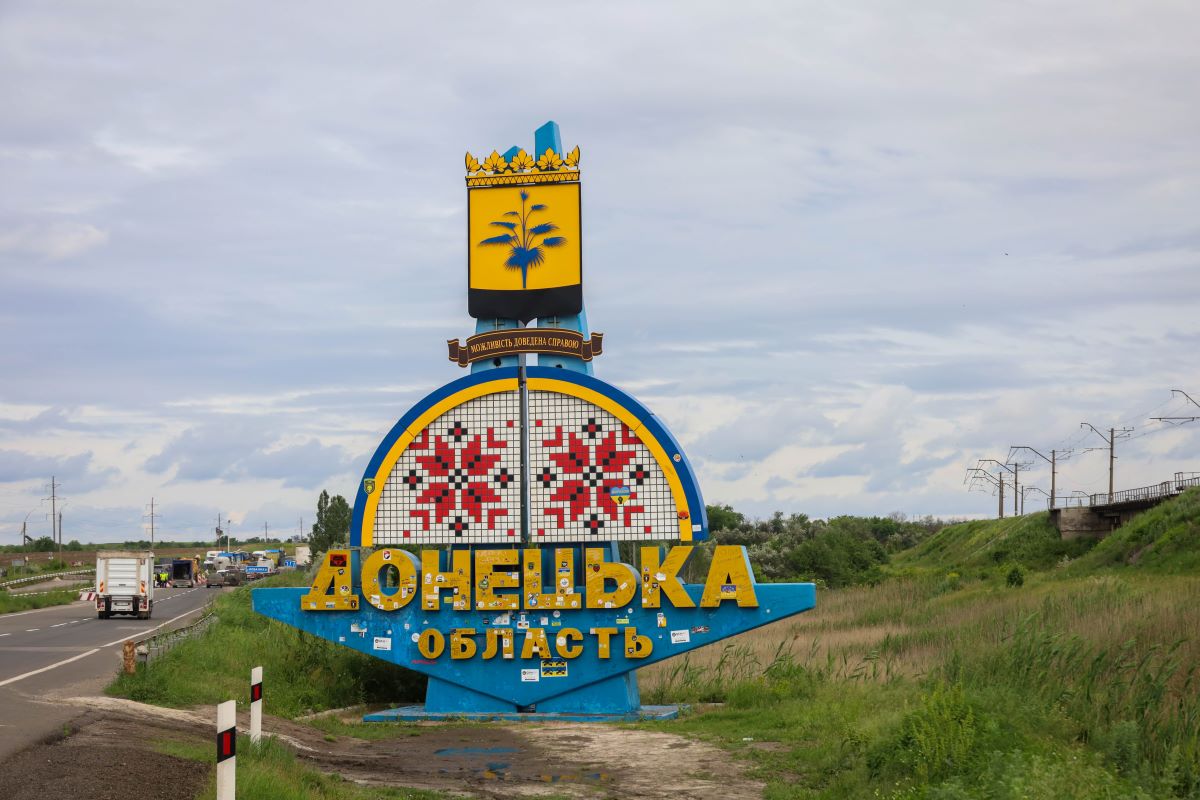
Ukraine has played a very bad hand very, very well – Brian Whitmore
Where Does Ukraine Fit in a World Where Hopes are Competing with Fears? Brian Whitmore tells Marta Dyczok how he sees it
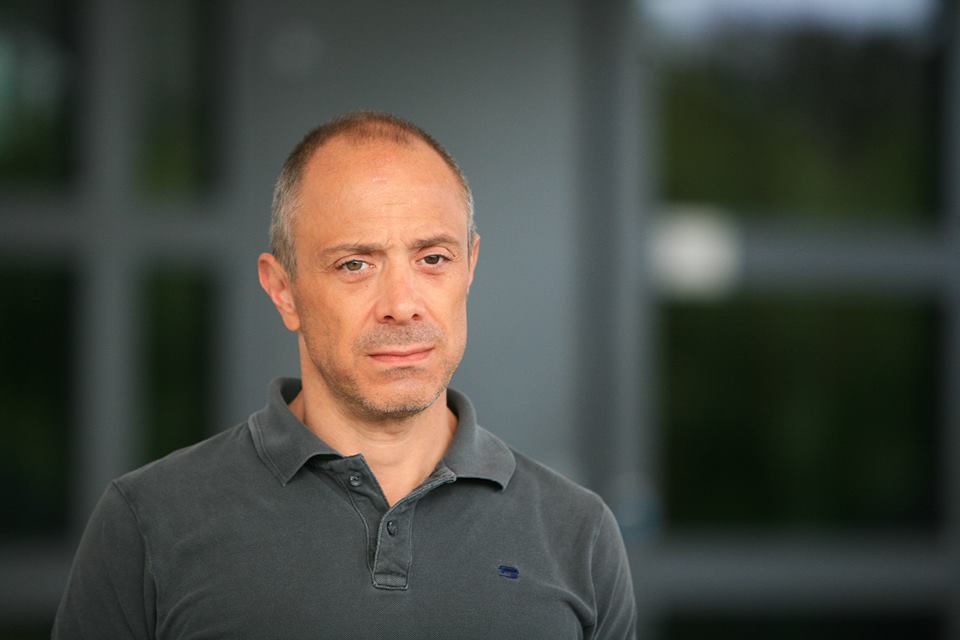
Hello and welcome to Ukraine Calling, your weekly review of what’s been happening in Ukraine with a focus on a main issue. I’m Kyrylo Loukerenko for Hromadske Radio in Kyiv, and here’s a look at some of the stories that were in the news this week.
Hromadske Radio is independently funded. We are appealing for funds through a crowd funding initiative. Should you feel inclined to donate, you can do so here using Wayforpay.
FOCUS INTERVIEW: Where Does Ukraine Fit in a World Where Hopes are Competing with Fears? Brian Whitmore tells Marta Dyczok how he sees it.
Dyczok: Brian Whitmore is a top international Russia analyst. He is an expert on Ukraine and Eastern Europe and the entire post-Soviet space. Brian has lived and worked in Russia and Ukraine. He’s currently based in Prague, where he works for Radio Free Europe/Radio Liberty, where he is the author of the very popular Power Vertical podcast, that informs international audiences about Russia, daily. He’s regularly invited to speak at international security conferences and was recently in Tbilisi, Georgia. Mr. Whitmore, thank you very much for much for finding the time to speak to us.
Whitmore: Thank you for having me.
Dyczok: Brian, we’re living in a world where the international security situation is very much in flux. It feels like the ground is shifting under our feet. Where does Ukraine fit into this picture?
Whitmore: That’s a good question. I’m having this debate, this ongoing debate with myself, whether we’re reliving the 1970s, which was a difficult time, or whether we’re reliving the 1930s, which was a catastrophic time. Up until recently, I thought it was the 70s. I said OK, the West has been through this before. We had this period of self-doubt that afflicted the West in the 1970s following the Vietnam War. Europe and America both were beginning to doubt the viability of their institutions. And we came out of that a lot stronger. You know how that movie ended, right. There’s also this risk, and I’ve been increasingly worried about this, that we might be repeating something closer to the 1930s, which represents a kind of an existential threat to our way of life. And to answer this I want to step back a little bit and get, not philosophical, but broaden the aperture a bit, and talk a little about civilization. Because we think about what makes civilization possible. What does make civilization possible? It’s our ability to tell each other stories, right? We tell each other stories that we all believe. But they only work if we all believe them. Think about money, right? Money’s a piece of paper with colours and numbers and dead people on it. You can bring it to the store and people will give you stuff for it. Why do they do that? Well they do that because we all believe in the value of this thing called money. And this can be said about religion, about the state, about all sorts of stories we tell each other, that bind human communities together, allow them to form civilizations and cooperate on a broad scale in a very flexible way.
Now Western civilization has told a series of very, very compelling stories. That individuals have rights. That the government should be accountable to the governed. That democratic elections are the only form of legitimacy. That small states have the right to sovereignty that is no less sacrosanct than big states, for example. We tell each other all of these very compelling stories and more and this has formed the basis of Western civilization. We’re at a point right now where a hostile outside power, and I don’t think we need to name the Russian Federation by name, is trying to cause us to question our stories.
And this is a big risk, because this is coming at a time when the West is going through one of its cycles of periodic self-doubt. This is a kind of natural organic process that happens in the West. Like I say, it happened in the 70s, it happened in the 30s. It’s happening again now. We’re questioning ourselves. This, in and of itself, isn’t bad, but when you have an outside power at that time trying to cause us to question our own values, which are our own stories, the stories that make our institutions possible, well that’s potentially very, very, very dangerous. And I think we’re seeing that right now.
And where does Ukraine fit into this picture? Ukraine’s actually very important in this picture, as is Georgia. Because as the West is doubting the viability of its own institutions, doubting the viability of its own stories, as the European Union is questioning the viability of the European Union, you have Ukrainians who are literally dying to get in. Who are, literally, right now, dying to be part of our story. So I think Ukraine is a very important part of this story, and in a lot of ways it should be a reality check for those of us in the West.
You’re right, I was in Tbilisi last week, speaking at a conference. And it was funny, when I came back to Prague, I had dinner with a bunch of Czech friends, and we were talking about the malaise that setting in in Europe and this lack of confidence in the European Union and I said, you know, the city that I was just in, people are dying to have your problems. And elsewhere, in Ukraine, people literally are dying to have those problems.
So I think Ukraine fits into this very well, because it shows that the Western story, which is expansionist. The Russians are right about that, but they’re wrong about how it’s expansionist. It’s expansionist in a voluntary way. It’s expansionist because it’s an attractive story. It’s an attractive story that others want to be a part of. And Ukraine and Georgia are very important components of that right now. And I think we need to recognize that.
Dyczok: Perhaps open to enlargement, rather than expansionist. But thank you for placing Ukraine in that story narrative. That’s an interesting way of looking at it.
I was recently reading an article about the role of emotion in international affairs and how emotions can trump reason very often: anger, frustration, fear. These are strong driving forces in the formulation of international security policy. What factors do you see driving international affairs, security questions at the moment?
Whitmore: I’m surely not the first to say this, but I think we are in the situation where our hopes are competing with our fears. Our hopes are competing with our fears and as I said before, the West is going through this period of self-doubt, where our fears, fears generated by a lot of very real things. The Iraq War undermined our faith in institutions. The 2008 crisis undermined our faith in institutions. The ensuing financial crisis in the European Union undermined our faith in institutions. The migrant crisis in Europe is undermining people’s faith in institutions and heightening people’s fear. And whenever you have this heightened sense of fear, you’re going to have politicians who will try to exploit that and try to appeal to people’s fears.
We have elections coming up in France this weekend, which I think, very starkly illustrate this. You have elections later this year in Germany, which very starkly illustrates this. But if you look over the course of the last year, from the US election to the Brexit campaign, to the campaign now in France, you’re seeing this struggle between hopes and fears.
And temporarily it did look like our fears were winning, but I’m an optimist at the end of the day, and I think at the end of the day, our hopes are going to win. Although I do fear, to use that word again, that we may risk repeating something from the 1930s. I still do believe we’re going through something like the 1970s and that we can get through this. But we have to remember to trust our stories, because our stories are good stories. The West has a good story to tell. It’s a story that, like I said, others badly want to be part of that story. People in Ukraine certainly want to be part of that story. And that should tell you something.
Dyczok: Well you framed a lot of what you said in terms of emotion, and the question I’m wondering about is, where is the role of reason in all of this? A lot of institutions are based on ideas, not so much emotions, but ideas and beliefs, that human rights are important, that as you said, every state has the right to self-determination. And these are intellectual constructs. I see a lack of new ideas in how to get out of the current international crisis we seem to be facing. What other factors other than emotion do you see playing a role in what’s happening in the international security environment?
Whitmore: Well I don’t think you can separate entirely the beliefs and emotions. Intellectually, I believe very deeply in the institutions of Western democracy. Intellectually, I believe very deeply in the viability of the US constitution, but I also have an emotional attachment to these things. I’ve an emotional attachment because I believe in these things. And that’s not just an intellectual process, that’s also an effective process. It’s an emotional process. I don’t think you can completely separate those things from each other. But I’ve been thinking a little bit about history.
And I have been thinking a lot about 1947, for example…
Dyczok: 1947? What happened in 1947?
Whitmore: ’47 is the real beginning of the Cold War. ’47 is the year the Policy of Containment came into effect. History doesn’t repeat itself. Sometimes it rhymes, sometimes it doesn’t. But we can look to history for some kind of guidance.
If you look back to ’47, you see why was the West able to survive an onslaught at that time against its values, which was coming from the Soviet Union, after the Great Depression, after the Second World War, when it was quite a risky time? And there were two elements that came into play. One was the Policy of Containment. This is outlined in George Kennan’s famous Mr. X article in Foreign Affairs, and before that, the Long Telegram.
But the other side of that, and this is something that’s often neglected, is the establishment of the Social Welfare State in Western Europe and North America. Because what that did, was it took away the rougher edges of Western liberal capitalism, and stole from the Soviet Union the ability to undermine it. And I think that over the last several last decades we have slowly but surely, step by step, cut back on the Social Welfare state, in both Europe and North America. And this has left a large disenfranchised working class, vulnerable to these kind of appeals that we’re seeing coming from Moscow right now. And they’re appealing directly to the fringes, left and right, in Europe and North America. And there are things that both the Western Left and the Western Right need to admit right now.
And the Western Left, which doesn’t like to say the policy of containment worked, needs to admit that the policy of containment did in fact work. And the Western Right, which doesn’t like to admit that the Social Welfare state basically saved Western capitalism, needs to admit that yes, it did indeed help save Western capitalism. So I think we need this two-pronged approach.
But this is difficult now, because one of the reasons the West cut back on the Welfare State. Containment’s easier to do. Step back for a second. Containment’s easier to do. Because we’ve basically done that before. We just have to update it to the 21st century. Russia’s not only using kinetic means, forceful means, to undermine the West, but they’re also using non-kinetic tactics. Such as information warfare, the weaponization of organized crime, the weaponization of corruption, the weaponization of international finance and we need to be much more vigilant about these kinds of things.
So we need a kind of Containment for the 21st century. It needs to be a whole of government approach. It doesn’t just include the military arms of government, but the non-military arms as well. Law-enforcement, regulatory agencies, and so on, and so forth. We need to tighten up our money laundering laws. We need to really keep an eye on corruption, because as I’ve said before, corruption is the new Communism. The Kremlin’s Black Cash is the new Red Menace.
I repeat that line always and anybody that’s heard me before is probably rolling their eyes, because I say this all the time. But I say it all the time for a reason, because it’s true. But we can do Containment. But the real tricky part, I think, is revamping the Social Welfare state for an age of globalization. Because how do you create a Social Welfare State in ..
Dyczok: in a globalized world.
Whitmore: In a globalized world. Where capital can move to where it’s going to be taxed the lowest rate and regulated the lowest. And that’s very, very, very tricky. But I’m sure there are some smart economists out there that can start thinking about this. Because last time around this was half of the equation that basically saved the West. These are two things I think, we need to start thinking about.
Another thing we have to start thinking about, and this concerns Ukraine and Georgia and Moldova, and all the neighbourhood countries on Russia’s periphery. That in the case of Ukraine and Georgia, by large margins, they want to be part of the West. Moldova’s more divided, a little more complicated.
But we have to find a way to bring these countries into the West in a way that’s doable. I think we need to start, the West needs to start being much more honest with our Ukrainian and Georgian partners, right now. Because we hear, but I hear it at every international conference I attend, that NATO’s doors are always open to anybody who wants to join. Yes OK, that sounds nice, right?
Dyczok: Those are just words though.
Whitmore: But you and I both know that right now, Ukraine’s not getting into NATO anytime soon. Georgia’s not getting into NATO anytime soon. Ukraine’s not getting into the EU anytime soon. Georgia’s not getting into the EU anytime soon. Large majorities in Ukraine and Georgia may want to join the EU, and slimmer majorities in Ukraine and large majorities in Georgia may want to join NATO. But I guarantee that large majorities of NATO and the EU do not want to take these two countries in right now.
I don’t think that’s right, but that’s the reality on the ground. And so what do we do right now? And I think the Association Agreement Georgia and Ukraine have recently just signed with the EU, is a step in the right direction. The visa-free travel is a step in the right direction. Because there’s a real risk right now. There’s a window of opportunity right now, where Ukraine and Georgia are extremely pro-Western, and really want to be part of the Western family, and the West is kind of keeping them at arm’s length. And there’s a danger that there’s going to be a backlash in these societies. And that we’re going to lose this opportunity.
I think the West needs to show that it’s going to welcome those who want to play by its rules, share in its stories, and be part of the western family. I think that’s very important for all of our security right now, let alone being morally correct.
Dyczok: Maybe I could just interrupt you here, Brian, sorry. You’ve been presenting it from the perspective of the West, Western institutions. Let’s reframe this. How would you assess Ukraine’s actions in the foreign policy arena over the past, say, three years?
Whitmore: I think Ukraine has played a very bad hand very, very well, in the foreign policy arena. If you look at where things looked in 2014, it looked pretty bleak. And Ukraine has, largely thanks to the surprising strength of the Ukrainian Armed Forces, the surprising strength of the Ukrainian society, they’ve basically fought Russia to a draw. And that’s no small accomplishment. And I think the Ukrainian authorities have been pretty good at presenting Ukraine’s case in the West. Where I think Ukraine’s coming up short is in domestic politics. Because this is as much a battle of governance as it is a war on the battlefield and part of international diplomacy. This is a battle of governance. Ukraine wants to be part of the West. Being part of the West means certain things in terms of transparency, fighting corruption, and so on and so forth. And I think in this area, particularly the recent NGO law, I see Ukraine coming up a little bit short here. Perhaps that’s too critical. Ironically, this is where the Ukrainian authorities do have the power to do what they need to do without Russian interference. It doesn’t depend on what the West wants to do. I think what Ukraine needs to do is to take a lesson from Estonia. Wind the clock back to 1991, the breakup of the USSR. Estonia, Latvia, and Lithuania, all three of the Baltics, wanted very much to join Western institutions. And Western institutions were not very thrilled with that idea at that time, if you remember correctly.
What the three Baltic States did, and Estonia in particular, was to make it literally impossible for the West to say no. The Estonians became more European than the Europeans. Reformed their economy, pretty much, they didn’t eradicate corruption, but they score pretty high on global anti-corruption indexes right now. And made it just simply impossible for the West to say no. in terms of NATO, NATO did not want to accept the Baltic States at that point, and they kept making the Baltics jump through hoops. Like they created the institution of MAP, the Membership Action Plan, something we all know about now. Do we know how this institution was created? It was created basically, as a bunch of hoops for the Baltic States to jump through. And the feeling was, they’re never going to jump through these hoops. Guess what. They jumped through every single one of those hoops. So what Ukraine needs to do is to take a page out of that book, and look at what Ukraine can do that is has control over, that can make itself as attractive to the West as possible. So to answer your question, it’s mixed. I think on the one hand Ukraine’s played a very bad hand very, very well. On the other hand I think at times, particularly in the domestic arena, they’ve shot themselves in the foot.
Dyczok: So, containment has been successful but building a Welfare State has not been successful in Ukraine, to refer to your earlier answer.
Whitmore: Ah, actually, I didn’t think of it that way, but that’s interesting. I was thinking about broader domestic politics than just the Welfare State, but I guess to have a successful Welfare State you do have to have a relatively transparent form of government, you have to minimize corruption, to the extent that’s possible. And again, as I said before, corruption is a national security issue, for Ukrainians more than anybody. Because Russia has weaponized corruption. Every corrupt deal basically empowers the Kremlin.
Dyczok: Brian you’re a top analyst of international affairs. If you were Ukrainian President Poroshenko’s foreign policy adviser, what would you be telling him to do right now, in the medium term, and in the long term?
Whitmore: I would be telling him to focus on reforming Ukraine’s domestic economy. I think that’s job number one. I think this is what Ukraine must do first and foremost.
Dyczok: Can I push you on that a little bit? I think most people would agree with that, but fighting corruption. How does one do that? You’re a foreign policy expert, not domestic, but the instruments to fight corruption. Ukraine has set up a number of institutions, they’ve tried to change personnel in various institutions. What are other instruments to actually fight corruption? And of course it’s both a domestic and international dimension, because Ukraine is part of a global economy.
Whitmore: I think first and foremost you have to have independent courts. You have to have prosecutors who are not subject to political pressure. And you have to have the political will to really eradicate this. And people at the top who are corrupt need to be prosecuted. This is what I’m saying, I’m seeing some positive steps, but I think we need to see more. Because I think, again, this is the most important thing, this war of governance is extremely important. Ukraine needs to make itself attractive to the West. And Ukraine has to minimize the levers that Moscow can have to undermine its domestic progress. I’ve read many times that Moscow’s ‘Plan B’ now, is to try and undermine Ukraine through the oligarchs. I think this is something we have to be very mindful and very, very vigilant about. I don’t know if this is happening yet, but this is something that we need to be very mindful of. Because basically we now have a struggle, we don’t have a Cold War, we have a struggle between two normative systems. One to the West, that’s based on all the things we hold near and dear, the rule of law, the rights of the individual, the sanctity of contracts, transparency, and so on. And one to the East that’s based on a whole different set of values: patron-client relationships, the subordination of law to power, corruption as an integral part of politics. These two normative systems are competing with each other. And Ukraine, not just in words, but in deeds, and very demonstrative deeds, needs to demonstrate which side of that divide it’s on. I have a strong sense of where the Ukrainian people are on this, I have a strong sense where civil society is on this. But I think it’s time for the Ukrainian authorities to catch up to their civil society on this. Because one of the hallmarks of the Ukrainian story is the gap between the civil society, which is extremely advanced, and the elite, which is not as post-Soviet as it was a decade ago, or even five years ago, but is still showing signs of that. The Ukrainian authorities have to become as good as Ukrainian civil society. And that is the single most important national security advice I would give to any Ukrainian leader.
Dyczok: Given the changes we’re seeing in the United States after the election of Donald Trump, how do I phrase this politely, the non-corrupt West, with the belief in institutions, rule of law, that seems to be coming under question. Corruption, disregard for procedures, seems to be increasingly visible in Washington. Where does that international picture leave us? We’ve got corruption in Russia, we’ve got a major, seemingly major change in style of politics, substance of politics in the US. Tillerson’s visit to Moscow recently, Ukraine almost did not come up except in the context of Crimea. But you are right, it was very much sort of going back to old foreign policy.
Whitmore: Yes, I know, it seems like it is going back to the default setting. And I think that again America has geopolitical interests and American foreign policy establishment has values that transcend any single president, regardless of which direction he or she would like to go. I think we have this image of the American president as this all-powerful figure, when the fact of the matter is the American president is quite limited. By design, by the genius of our Constitution. So, I am less apocalyptic about this than I was. What does worry me a bit is that you may have a lack of American attention to places like Ukraine and Georgia right now.
Dyczok: The comment by Tillerson, that why should the US taxpayer be interested in Ukraine…
Whitmore: Yes, there are answers to that. But the problem is that you just going to have a level of attentiveness that you have. And Moscow is looking for this. Moscow is hoping that the US will not be attentive to this part of the world. And that this will, if not explicitly give a freer hand, at least implicitly give it a freer hand. But I don’t see that happening right now. I think you have powerful voices in the US that care a lot about what happens in the European neighborhood, I mean in Ukraine, in Georgia, certainly in the Baltic states. You see NATO basically has become revived, and this is not slow down as a result of US elections: US troop presence in the Baltic states, NATO troop presence, US, Canadian, British troop presence in the Baltic states now. Did I leave anybody out there?
Dyczok: No, I think you covered them all…
Whitmore: So, these are encouraging signs. And I guess I still believe in our stories, and I think although our stories are coming under a degree of assault right now, our stories will persevere in a long run.
Dyczok: Well, it sounds like the story that Ukraine needs to decide where it wants to be, Russia needs to decide where it wants to be…
Whitmore: I think they both have decided. I think Ukrainian society has clearly decided where it wants to be, if I can believe the poll numbers and believe what I see when I do visit Ukraine, and what I hear. I think Ukraine has.., this is the most telling thing of the last several years, that Ukraine has made its choice. It is now the Eastern most Western country, rather than the Western most Eastern country. And that’s despite the problems. And I think that’s an important choice. The trick now is for Ukraine’s leaders – to catch up with the society.
Dyczok: Well, I do not where to take this conversation, but I don’t know if Russia has decided on its story. I think, to use your parallel, Russia’s leadership is very vocal in its statements. I wonder what Russian society is thinking, which story it wants. And I think that part of Ukraine’s leadership is very much on the European page, on that international page. The corruption is something that needs to be sorted out, but if we look at Italy, if we look at various other countries, corruption is a problem in many, many places. But you’ve given us a very reasonable and in many ways very hopeful picture for the future. It does not look as uncertain as perhaps it did a year ago. Is there anything you would like to add, Brian?
Whitmore: Yes, maybe just on your issue where Russian society is. That’s a very good question, because it is very much in flux right now. It is very paradoxical in a lot of ways, because you look, two thirds of Russians hold Putin personally responsible for corruption. You have truckers’ protests over a road tax, the money from which is going to a Putin crony. On March 26th you had a massive nation-wide demonstrations against corruption. They were called by the opposition figure Alexey Navalny. But yet, Putin’s popularity is in a stratosphere. It is over 80%. How do you square this paradox? It is kind of weird. And there was a very interesting piece today in republic.ru by political analyst Tatyana Starovaya, which explained it as follows. She said, basically, expressing support for Putin is almost a ritual right now, it is ritualistic. It is not an active expression of support, but it is kind of this passive acquiescence in the situation. And it is also driven by a fear that things can get worse. And I think that is very true. And that made me think that this is very similar to a Soviet period, where support for the regime was this empty ritual. And we know where that led, right? So it is very, very delicate time in Russia right now. It is almost like we are continuing a story that we had from 2011, when the Putin’s regime looked like it was in a very great danger. 2001, 2012, now that of course was changed by the war in Ukraine, by the annexation of Crimea. The metaphor I’ve used for that is that Putin basically drugged the population with this euphoric drug of Crimea. It is like he gave the society a collective hit of cocaine or something. But what all drugs do is they wear off. And I think this is wearing off right now. The question is: when the drug wears off, will the addict go for another hit? Because they are depending on that drug. And this worries me a little bit. That as this regime feels threatened, it is going to seek a new foreign adventure, a new drug to whip the society back into the state of patriotic euphoria. The Crimea drug was very powerful, I do not know what is going to be as powerful as that. But this has got me worried a little bit. But these are very interesting trends in Russian society right now. Navalny has already called for a nation-wide protest on the 12th of June. So it is promising to be a pretty hot summer. But the domestic Russian politics story is coming back. I wasn’t really paying as much attention to domestic Russian politics in the last few years, because foreign affairs have been so dominant. But now the domestic politics seems to be coming back into the equation. Russia is facing an election next year. This is a centennial of the Bolshevik revolution, which is causing a lot of worries in Kremlin, because they do not know how to frame this. If they stage themselves as anti colored revolution, that was their identity for so long, then guess what, the first colored revolution was not Orange.
Dyczok: It was Red.
Whitmore: It happened in St. Petersburg, Putin’s hometown. So they are having a lot of trouble framing this. And this is all happening as they are preparing for elections next year, which they hope to be just a coronation of Putin. They switched the election date to the anniversary of the annexation of Crimea, to milk that for all it is worth. But at the same time we see truckers protest, we see protests in regions over wage arrears. And we are seeing this wave, generated by Navalny, of protests against corruption. And this is beginning to resonate. And it is certainly merits watching. This does not mean that Russia is shifting into a Western direction. The decline of this regime does not automatically translate into a pro-Western Russia. I do not think that that’s the case at all.
Dyczok: Well, anticorruption is a universal emotion, but I think it is a positive trend.
Whitmore: Exactly..
Dyczok: I guess to summarize what you’ve said, we see a clash between emotion and reason, and very tight relations between domestic and foreign policies both in Russia and Ukraine and in other countries. We have been speaking with Brian Whitmore from Prague, who is a host and author of the Power Vertical for RFERL, so watch for that and I am Marta Dyczok for Hromadske Radio. Thanks for listening.
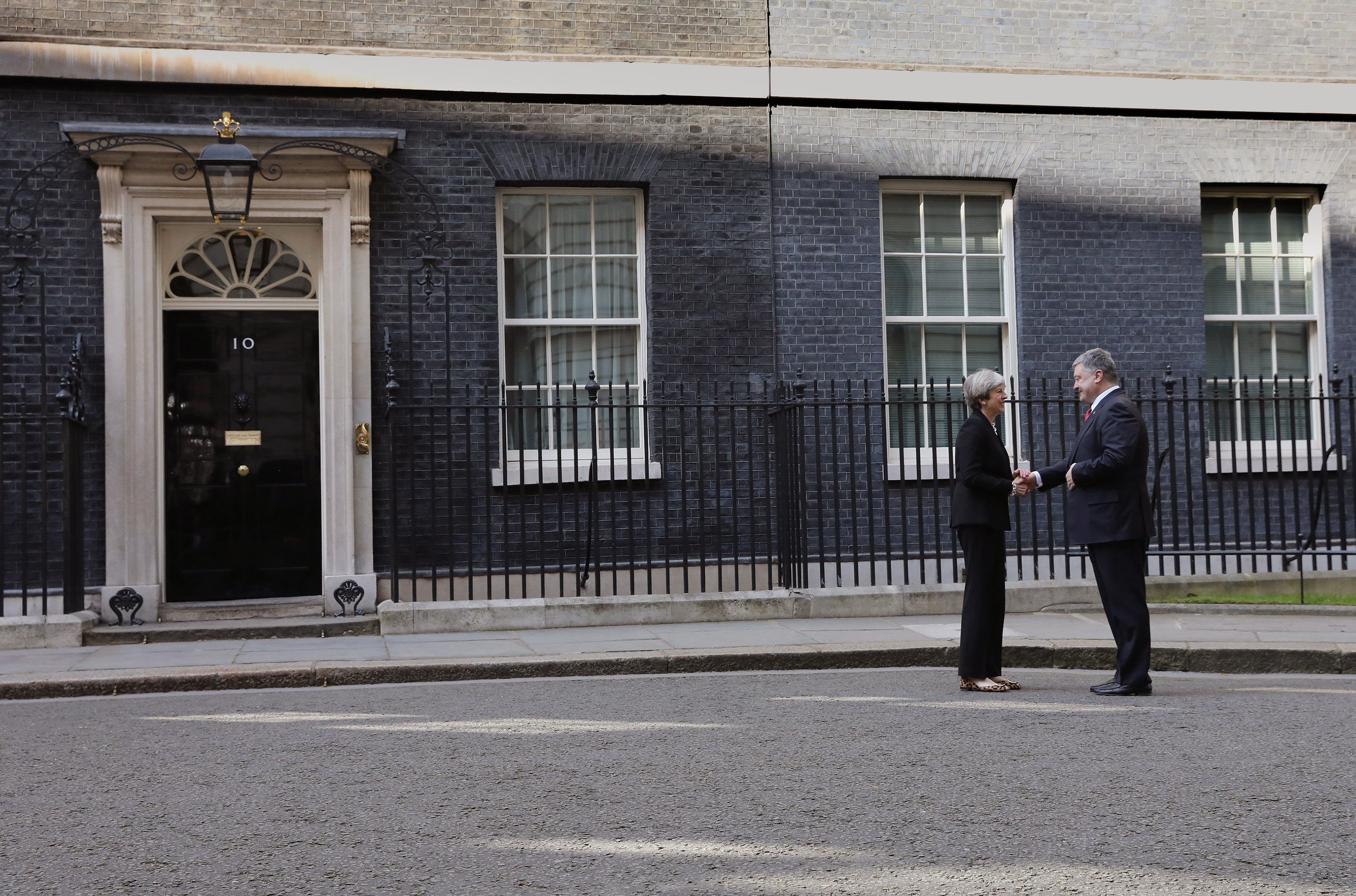
HEADLINES
Ukraine’s President Poroshenko in England
British Prime Minister Theresa May called for early Parliamentary elections this Wednesday. She also welcomed Ukraine’s President Poroshenko at 10 Downing Street that same day. In this rapidly changing international environment, Poroshenko is looking to maintain strong links with Ukraine’s allies. May reassured the Ukrainian President that the UK ‘stood ready’ to support Ukraine in the face Moscow’s aggression. That Brexit would not affect British-Ukrainian cooperation. And that she would insist that sanctions against Russia remain in place, until the Minsk agreement was fully implemented.
During his trip to London Poroshenko also met with British Foreign Secretary Boris Johnson, and Armed Forces Minister Mike Penning. The main topics on Poroshenko’s agenda were security, support for Ukraine, the war in the Donbass, enhancement of bilateral military cooperation, cybersecurity, and counteracting propaganda. He also talked about economic cooperation, simplifying visa requirements for Ukrainians, and technical assistance. Poroshenko’s official website reported that plans were made to hold an international conference in London this July, on reforms in Ukraine.
Poroshenko also appeared on Sky News, where his main message was: what’s going on in Ukraine is not a frozen conflict, but hot Russian aggression against Ukraine. He cited casualty statistics.

International Court of Justice Ruling
The International Court of Justice issued a ruling this week in Ukraine’s case against Russia. The case was filed by Ukraine on January the 16th of this year. There were two parts to Ukraine’s case. One was charging Russia with Financing and Sponsoring Terrorism against Ukraine, as a violation of the International Convention for the Suppression of the Financing of Terrorism. The other charged Russia with discriminatory activities in Crimea, in violation of the International Convention on the Elimination of All Forms of Racial Discrimination.
The UN’s highest court ruled in Ukraine’s favour on the second part. The official wording is as follows, “The Court finds that Russia must refrain from imposing limitations on the ability of the Crimean Tatar community to conserve its representative institutions, including the Mejlis, and ensure the availability of education in the Ukrainian language. THE HAGUE, 19 April 2017.”
On the charge of Russia sponsoring terrorism, the court did not rule in Ukraine’s favour. Here’s the official wording: “The Court is of the view that, at this stage of the proceedings, Ukraine has not put before it evidence which affords a sufficient basis to find it plausible that these elements are present. Therefore, it concludes that the conditions required for the indication of provisional measures in respect of the rights alleged by Ukraine on the basis of the ICSFT are not met.”
We’ll post a link to the court’s decision on our website.
War
Easter was celebrated in Ukraine’s war zone. Despite the fact that the bombing and heavy shelling continued, priests held services for soldiers all along the frontlines. And on Easter, day no Ukrainian soldiers were killed or wounded. Later in the week, the town of Avdiivka in Donets’k oblast once again became the hot spot in the war zone. Eight residential buildings were destroyed by heavy bombardment on Tuesday, leaving residents homeless and neighbourhoods without power. The town has a major Coke and Chemical works factory. We’ll post a video of the attack on our website. During the past week 10 Ukrainian servicemen were wounded.
Innovation
Despite war continuing in the eastern part of Ukraine, the country is continuing to innovate. An Innovation Park was opened in Kyiv earlier this month. The 25 hectare park is called UNIT.City, and is modelled on Silicon Valley giants like Google and Apple. It aims to provide small and medium sized businesses access to infrastructure necessary for rapid development by combining educational, business, cultural, medical, sports, and entertainment facilities on one site. The target audience are Ukrainian and international companies in areas of high technology, creative ideas and innovative business, R & D centers, start-ups and IT companies. The project plans to create 15,000 highly paid jobs for Ukrainians, and prevent further brain drain from the country.
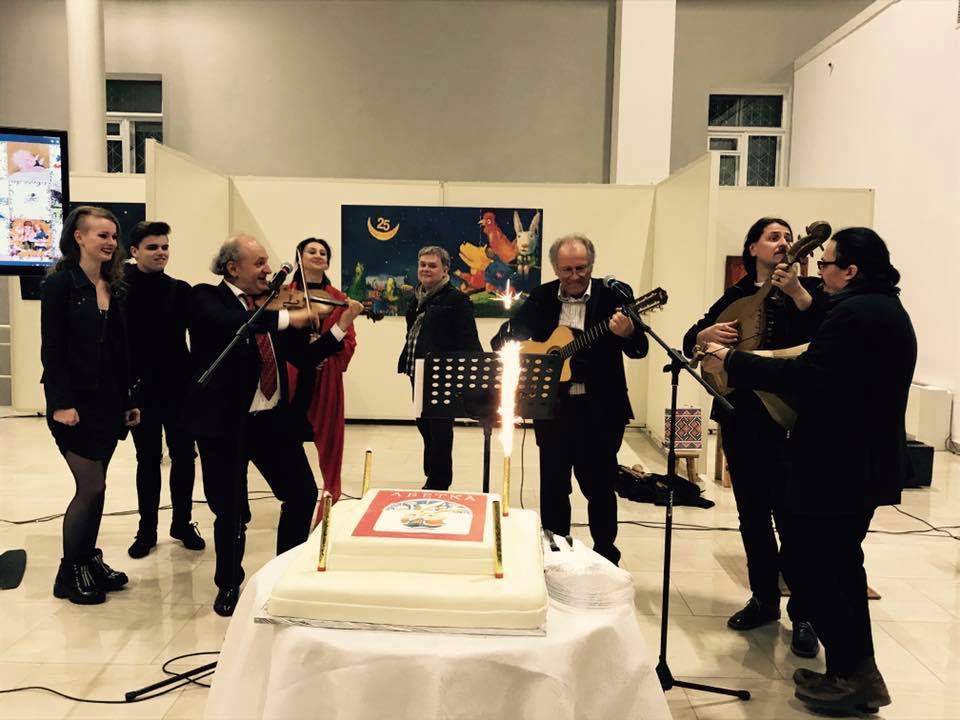
CULTURE
A-BA-BA-HA-LA-MA-HA celebrated it’s 25th birthday this week! It’s a Ukrainian publishing house set up by the poet Ivan Malkovych back in 1992, just after Ukraine became independent. He started off publishing children’s books, and the first post-communist generation of children grew up reading beautifully produced books in Ukrainian. The company later expanded into translation and adult literature, and keeps winning national and international awards. It brought the Harry Potter series to Ukrainian audiences in the Ukrainian language. Malkovych was particularly proud that the popular series was available in Ukrainian before it was translated in Russia. They now produce interactive books that can be read on your iPad, and their Ukrainian books have been translated into many languages! This year Malkovych received the prestigious Shevchenko prize for poetry, and his publishing company party was held at the Taras Shevchenko Museum in central Kyiv.
Google is helping promote tourism in Ukraine and Poland. It has just released a virtual tour of the UNESCO World Heritage list of Wooden Churches in the Carpathian mountain region, in the west of the country. Eight of the churches are in Ukraine, another eight are in Poland. A video with 3D tours, narrated in English, explaining the history and culture of the churches was produced by Google.Ukraine in cooperation with Ukraine’s Culture Ministry. The Churches are also available on Google Street View. You can take the tour here.
For those more interested in contemporary culture, Ukraine is gearing up to host the 2017 Eurovision contest next month. This week the hosts for the extravaganza were announced: Volodymyr Ostapchuk, Oleksandr Skichko and Timur Miroshnychenko. They held a press conference and promised lots of surprises. Script writers for the contest have already started arriving from London for the preparations.
And they will have seen the new exhibit in Kyiv International Airport which just opened. It’s a project called ‘Prominent Ukrainians’, and it aims to depict Ukrainian history and culture through contemporary graphic art. It was first exhibited in the Ukrainian Presidential Administration Buildings, but now will be shown to a wider, international audience. The co-author of the project Hennadiy Kurochka said that he hopes thousands of selfies will be taken next to these images as international visitors pass through the airport. And that will “spread information about the bright Ukrainian culture throughout the globe.”
MUSIC
People continue to write and perform songs even during war. This week here’s a new song for you, by the guitar-bandura duo Inglia. They’re from Dymer, a small town in Kyiv oblast. It’s called ‘Pisnia pro Liubov,’ which means A Song about Love. The refrain has these lyrics: ‘regardless if it’s thundering or raining, if the war’s going on and blood continues to be spilled, this song will be about love.’ Enjoy!
LOOKING FORWARD
As the weather starts to get warmer, many of you might already be thinking about your summer travel plans. We’ll be bringing you a feature episode about travel in Ukraine soon. And next week, as always, we’ll have more stories and current events. Tune in for a new episode. And we’d love to hear from you. Write to us at [email protected]. I’m Kyrylo Loukerenko for Hromadske Radio in Kyiv. Thanks for listening.
Interview transcribed by Ilona Szieventsev, Oksana Smerechuk, and Marta Dyczok. Headlines, Culture, and Music by Marta Dyczok. Sound engineers Timothy Glasgow and Andriy Izdryk. Special thanks to Western Radio for use of studio and technical assistance. Web support Kyrylo Loukerenko.
